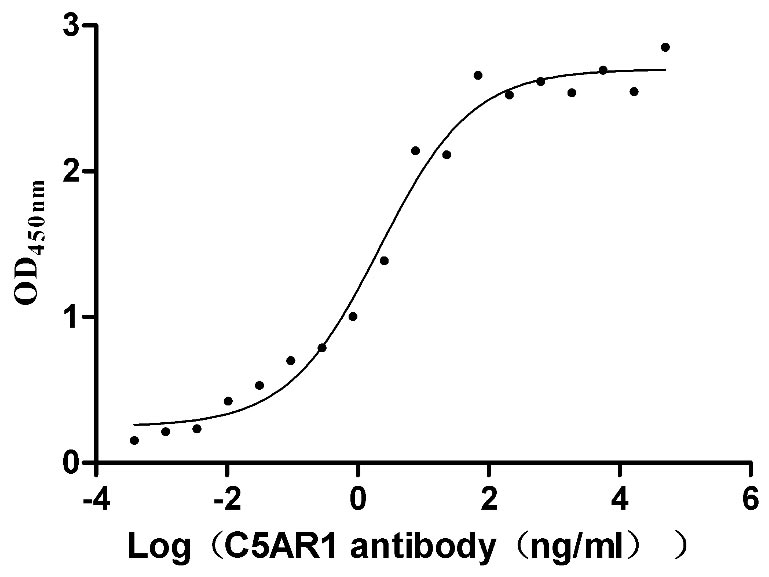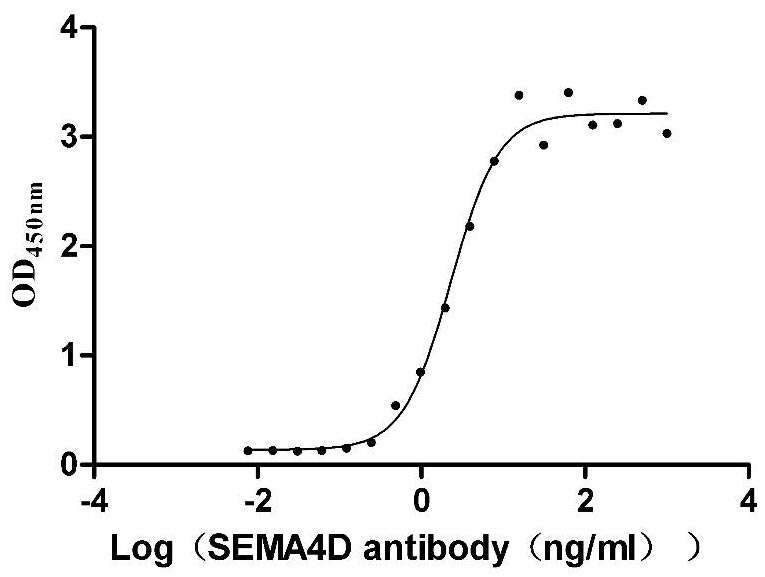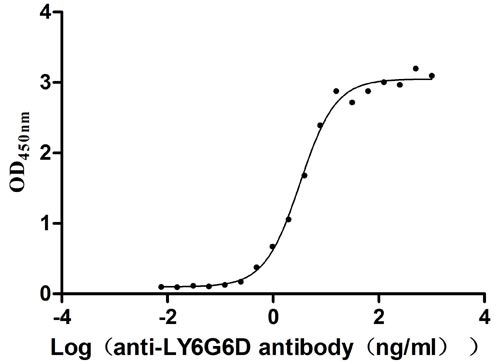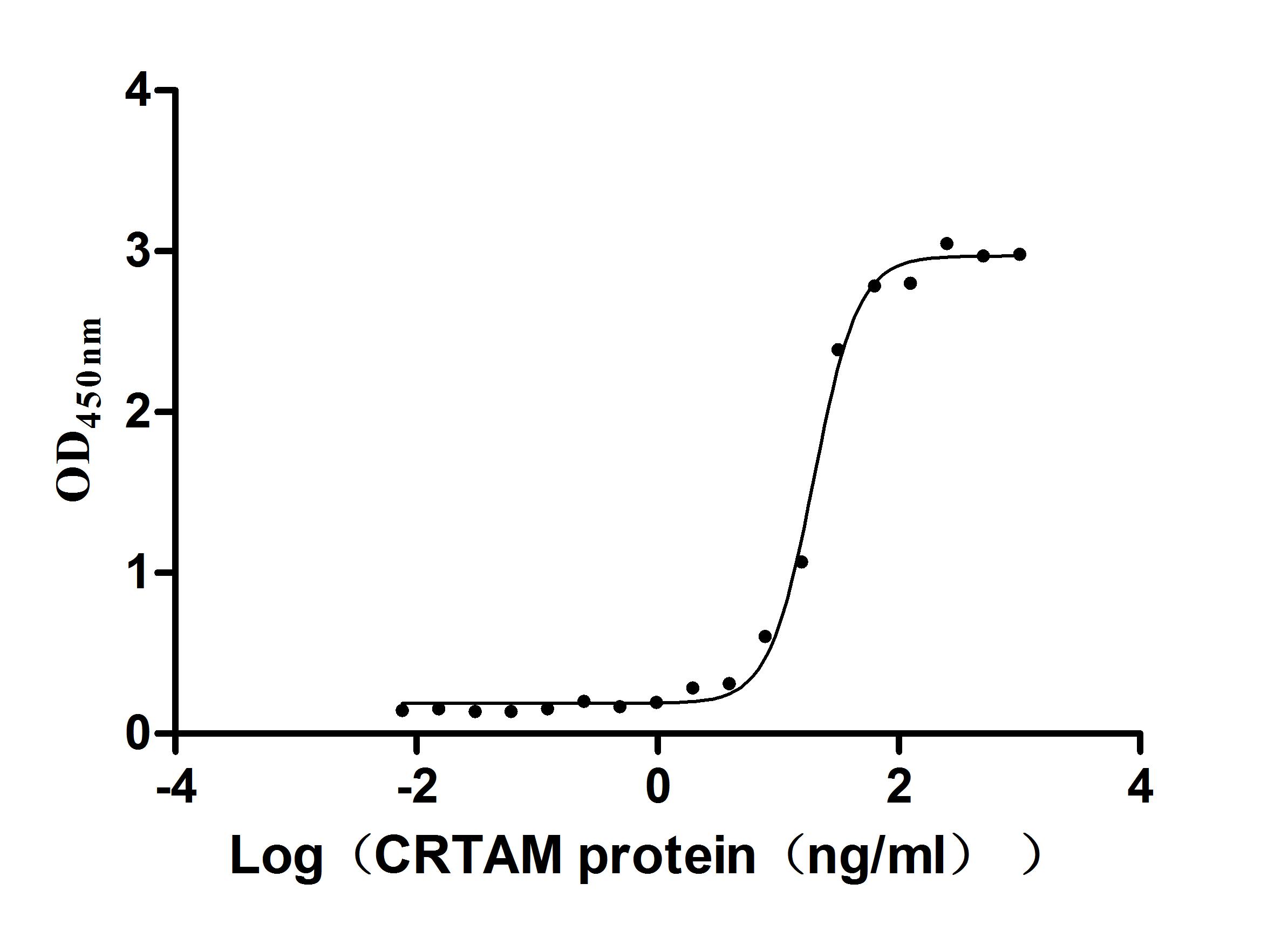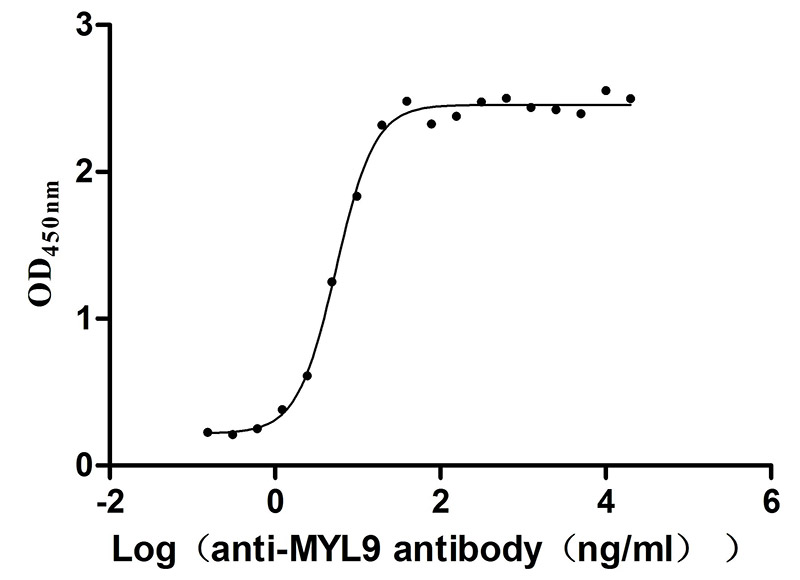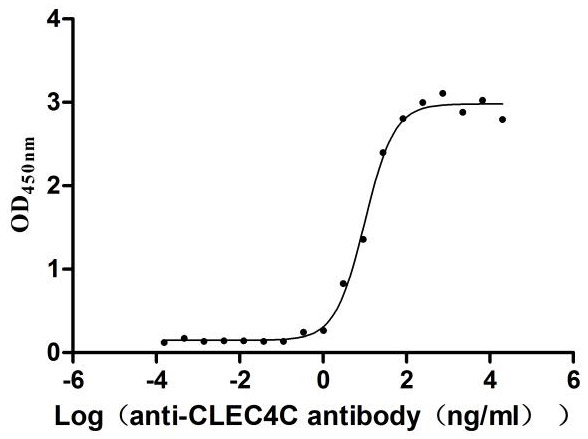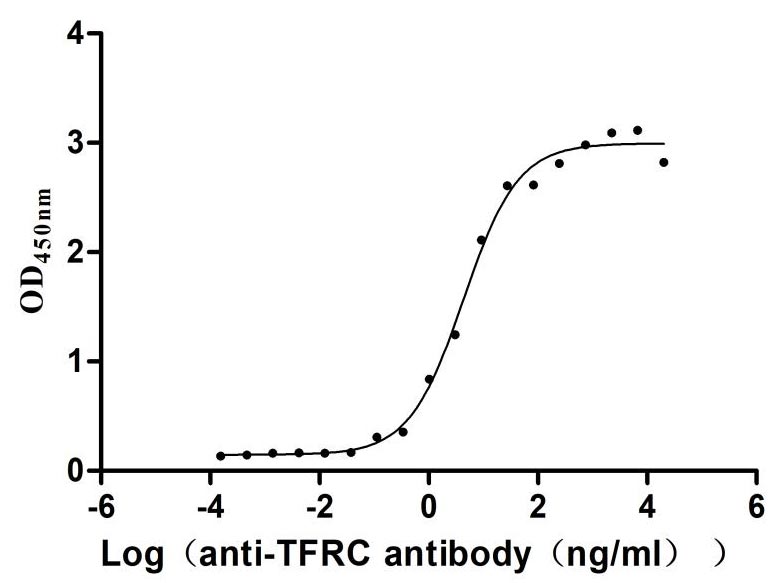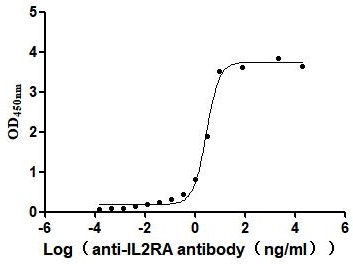Recombinant Mouse Zinc finger and BTB domain-containing protein 7B (Zbtb7b)
-
中文名称:小鼠Zbtb7b重组蛋白
-
货号:CSB-YP731047MO
-
规格:
-
来源:Yeast
-
其他:
-
中文名称:小鼠Zbtb7b重组蛋白
-
货号:CSB-EP731047MO
-
规格:
-
来源:E.coli
-
其他:
-
中文名称:小鼠Zbtb7b重组蛋白
-
货号:CSB-EP731047MO-B
-
规格:
-
来源:E.coli
-
共轭:Avi-tag Biotinylated
E. coli biotin ligase (BirA) is highly specific in covalently attaching biotin to the 15 amino acid AviTag peptide. This recombinant protein was biotinylated in vivo by AviTag-BirA technology, which method is BriA catalyzes amide linkage between the biotin and the specific lysine of the AviTag.
-
其他:
-
中文名称:小鼠Zbtb7b重组蛋白
-
货号:CSB-BP731047MO
-
规格:
-
来源:Baculovirus
-
其他:
-
中文名称:小鼠Zbtb7b重组蛋白
-
货号:CSB-MP731047MO
-
规格:
-
来源:Mammalian cell
-
其他:
产品详情
-
纯度:>85% (SDS-PAGE)
-
基因名:Zbtb7b
-
Uniprot No.:
-
别名:Zbtb7b; Thpok; Zfp67; Zinc finger and BTB domain-containing protein 7B; Krueppel-related zinc finger protein cKrox; c-Krox; T-helper-inducing POZ/Krueppel-like factor; Zinc finger protein 67; Zfp-67; Zinc finger protein Th-POK
-
种属:Mus musculus (Mouse)
-
蛋白长度:full length protein
-
表达区域:1-544
-
氨基酸序列MGSPEDDLIG IPFPDHSSEL LSCLNEQRQL GHLCDLTIRT QGLEYRTHRA VLAACSHYFK KLFTEGGGGT VMGTGGGGTA SGGAGAGVCE LDFVGPEALG ALLEFAYTAT LTTSSANMPA VLQAARLLEI PCVIAACMEI LQGSGLEAPS PDEDDCERAR QYLEAFATAT TTASTSGMPN GEDSPPQVPL LPPPPPPPRP VARRSRKPRK AFLQTKGARA NHLVPEAPTV LTHPLTYEEE EMVGRLGNSG GSGLGDSYSP PTGAASPAEG PLNYEVFEGE EEEEEMAYPP GYGLAQSNEP SLSPEELGSD EDPIDPDLMA YLSSLHQDAL TPGLDGQDKL VRKRRSQMPQ ECPVCHKIIH GAGKLPRHMR THTGEKPFAC EVCGVRFTRN DKLKIHMRKH TGERPYSCPH CPARFLHSYD LKNHMHLHTG DRPYECHLCH KAFAKEDHLQ RHLKGQNCLE VRTRRRRKDD VAAPHYPPPS TTTSSPAGLD LSNGHLDTFH LSLARFWEQS ATTGPPVTTQ GPPEEEEEEG TPTTPQAEGA MESS
-
蛋白标签:Tag type will be determined during the manufacturing process.
The tag type will be determined during production process. If you have specified tag type, please tell us and we will develop the specified tag preferentially. -
产品提供形式:Lyophilized powder
Note: We will preferentially ship the format that we have in stock, however, if you have any special requirement for the format, please remark your requirement when placing the order, we will prepare according to your demand. -
复溶:We recommend that this vial be briefly centrifuged prior to opening to bring the contents to the bottom. Please reconstitute protein in deionized sterile water to a concentration of 0.1-1.0 mg/mL.We recommend to add 5-50% of glycerol (final concentration) and aliquot for long-term storage at -20℃/-80℃. Our default final concentration of glycerol is 50%. Customers could use it as reference.
-
储存条件:Store at -20°C/-80°C upon receipt, aliquoting is necessary for mutiple use. Avoid repeated freeze-thaw cycles.
-
保质期:The shelf life is related to many factors, storage state, buffer ingredients, storage temperature and the stability of the protein itself.
Generally, the shelf life of liquid form is 6 months at -20°C/-80°C. The shelf life of lyophilized form is 12 months at -20°C/-80°C. -
货期:Delivery time may differ from different purchasing way or location, please kindly consult your local distributors for specific delivery time.Note: All of our proteins are default shipped with normal blue ice packs, if you request to ship with dry ice, please communicate with us in advance and extra fees will be charged.
-
注意事项:Repeated freezing and thawing is not recommended. Store working aliquots at 4°C for up to one week.
-
Datasheet :Please contact us to get it.
靶点详情
-
功能:Transcription regulator that acts as a key regulator of lineage commitment of immature T-cell precursors. Exerts distinct biological functions in the mammary epithelial cells and T cells in a tissue-specific manner. Necessary and sufficient for commitment of CD4 lineage, while its absence causes CD8 commitment. Development of immature T-cell precursors (thymocytes) to either the CD4 helper or CD8 killer T-cell lineages correlates precisely with their T-cell receptor specificity for major histocompatibility complex class II or class I molecules, respectively. Cross-antagonism between ZBTB7B and CBF complexes are determinative to CD4 versus CD8 cell fate decision. Suppresses RUNX3 expression and imposes CD4+ lineage fate by inducing the SOCS suppressors of cytokine signaling. induces, as a transcriptional activator, SOCS genes expression which represses RUNX3 expression and promotes the CD4+ lineage fate. During CD4 lineage commitment, associates with multiple sites at the CD8 locus, acting as a negative regulator of the CD8 promoter and enhancers by epigenetic silencing through the recruitment of class II histone deacetylases, such as HDAC4 and HDAC5, to these loci. Regulates the development of IL17-producing CD1d-restricted naural killer (NK) T cells. Also functions as an important metabolic regulator in the lactating mammary glands. Critical feed-forward regulator of insulin signaling in mammary gland lactation, directly regulates expression of insulin receptor substrate-1 (IRS-1) and insulin-induced Akt-mTOR-SREBP signaling. Transcriptional repressor of the collagen COL1A1 and COL1A2 genes. May also function as a repressor of fibronectin and possibly other extracellular matrix genes. Potent driver of brown fat development, thermogenesis and cold-induced beige fat formation. Recruits the brown fat lncRNA 1 (Blnc1):HNRNPU ribonucleoprotein complex to activate thermogenic gene expression in brown and beige adipocytes.
-
基因功能参考文献:
- Zbtb7b recruits the brown fat Blnc1/heterogeneous nuclear ribonucleoprotein U (hnRNPU) ribonucleoprotein complex to activate thermogenic gene expression in adipocytes. PMID: 28784777
- Th-POK functions as an important feed-forward regulator of insulin signaling in mammary gland lactation. PMID: 29420538
- epigenetic regulation through microRNA-133b-regulated Th-POK expression and signals provided by dendritic cells are fundamental for thymic NKT17 cell differentiation PMID: 27605013
- this study shows that Thpok and LRF are redundantly required to maintain the size and functions of the postthymic Treg pool PMID: 28754678
- Together, these results suggest a novel mechanism regulating endothelial PATZ1 expression based on the down-regulation of miR-24 expression caused by hyperglycemia. Interfering with PATZ1 expression via miRNAs or miRNA mimics could potentially represent a new way to target endothelial PATZ1-dependent signaling of vascular dysfunction in diabetes. PMID: 27983982
- Runx3 is crucial for the phenotypic and functional changes observed in ThPok-deficient invariant natural killer T cells. PMID: 24561456
- present evidence that ectopic ThPOK expression gives rise to a preleukemic and self-perpetuating DN4 lymphoma precursor population PMID: 26056302
- Data indicate that transcription factors Thpok and LRF redundantly maintain CD4+ lineage integrity. PMID: 25129370
- induction of SOCS-encoding genes is the main mechanism by which ThPOK imposes the CD4(+) lineage fate in the thymus PMID: 24880459
- The role of TCF-1 and LEF-1 in the CD4-versus-CD8 lineage 'choice' was mediated in part by direct positive regulation of the transcription factor Th-POK PMID: 24836425
- These findings imply that long-lasting T-cell receptor signals are needed to establish stable Thpok expression activity to commit to helper T-cell fate. PMID: 23481257
- Gata3 promotes Cd4 expression in Thpok-deficient thymocytes. PMID: 23310955
- Data indicate that Valpha14 invariant natural killer T (Valpha14i NKT) cells from Th-POK-mutant helper deficient (hd/hd) mice have increased transcripts of genes normally expressed by Th17 and NKT17 cells. PMID: 23034280
- ZBTB7B is a critical factor genetically predetermining the balance of effector subsets within the NKT cell population. PMID: 23105140
- Th-POK and Runx3 transcription factors are reciprocally involved in the control of G1-phase progression, on which they exert their functions dependently. PMID: 23018457
- T cells lacking Thpok, which only displayed LRF-dependent functions, contributed to multiple effector responses, both in vitro and in vivo, with the notable exception of Th2 cell responses that control extracellular parasites PMID: 23041065
- comparing the promoter regions of the Th-POK gene between human and mouse, the region 3600 base pairs upstream from the transcription initiation site of the Th-POK gene was highly conserved PMID: 20847520
- required for the differentiation of CD1d-restricted CD4+ NKT cells PMID: 20706986
- impairment of Lck-mediated CD4 coreceptor signaling by Nef is an important in vivo mechanism of HIV-1 pathogenesis PMID: 20810990
- Data show that ThPOK expression in gammadelta thymocytes is regulated by TCR signalling, that ThPOK is an important mediator of gammadelta T cell development/maturation, and that development of some gammadelta T cells depends on TCR engagement/signalling. PMID: 20551904
- Broad-complex and BTB-ZF gene ThPOK is a member of the tramtrack bric-a;-brac (BTB)-poxvirus-zinc finger family of transcription factors and is important for the phenotype of promyelocytic leukemia zinc finger (PLZF)-expressing gamma delta T cells. PMID: 20038637
- a point mutation in the zinc finger transcription factor Th-POK (T-helper-inducing POZ/Kruppel-like factor) is responsible for redirection of class-II-restricted thymocytes to the CD8 lineage in helper-deficient mice [Th-POK] PMID: 15729333
- Th-POK directs CD4 lineage differentiation during intrathymic T-cell positive selection. PMID: 15750595
- Role of Th-POK in CD4:CD8 lineage commitment PMID: 16448546
- cKrox transduction into CD8 T cells inhibits their expression of CD8 and cytotoxic effector genes and impairs their cytotoxic activity, and that it promotes expression of helper-specific genes, although not of CD4 itself. PMID: 17296789
- findings demonstrate that the transcription factor Zbtb7b promotes CD4 expression by antagonizing Runx-mediated CD4 repression PMID: 17878336
- Th-POK expression and genetic programming for T helper cell development are actively inhibited by Runx-dependent silencer activity, allowing for cytotoxic T cell differentiation PMID: 18258917
- we investigate the regulation of ThPOK expression and its subsequent control of CD4+ T cell commitment PMID: 18342007
- GATA-3 and ThPOK have essential and nonredundant functions during early CD4+ cell differentiation before lineage commitment PMID: 18776904
- ThPOK may not be essential for specification of the CD4 lineage PMID: 18776905
- inefficient upregulation of ThPOK resulted in the transdifferentiation of helper lineage-specified cells into the cytotoxic T cell lineage. PMID: 18776907
- a key function of Zbtb7b in the mature CD4+ T cell compartment is to repress CD8-lineage gene expression. PMID: 19062319
- Review summarizes recent advances on the regulatory function of transcription factor Thpok, a zinc finger protein which is required for CD4 T-cell lineage differentiation. PMID: 19696430
显示更多
收起更多
-
相关疾病:Defects in Zbtb7b are the cause of helper deficient disease (HD) or helpless disease. HD and helpless mice are distinguished by the virtual absence of peripheral T-cells of the CD4(+)CD8(-) major histocompatibility complex (MHC) class II-restricted T-helper subset due to a specific block in thymic development. The developmental defect is selective for CD4(+)CD8(-) cells; the maturation of CD4(-)CD8(+) and gamma delta T-cells is normal indicating that lineage commitment is specifically perturbed without affecting positive selection. In helpless disease, NKT cells are hyperproliferative, most lack CD4 and instead express CD8. The majority of NKT cells in the thymus produce IL17 with high frequency while very few produce IFNG or other cytokines (PubMed:23105140).
-
亚细胞定位:Nucleus.
-
组织特异性:Widely expressed, with a higher level in skin. Expressed in thymus. Restricted to CD4 cells (mature single positive CD4(+) and intermediate CD4(+)CD8(+) cells). Expressed in the luminal epithelial cells in the mammary glands where is up-regulated at late
-
数据库链接:
KEGG: mmu:22724
STRING: 10090.ENSMUSP00000029677
UniGene: Mm.262184
Most popular with customers
-
Recombinant Human C5a anaphylatoxin chemotactic receptor 1 (C5AR1)-VLPs (Active)
Express system: Mammalian cell
Species: Homo sapiens (Human)
-
Recombinant Macaca mulatta Semaphorin-4D isoform 1 (SEMA4D), partial (Active)
Express system: Mammalian cell
Species: Macaca mulatta (Rhesus macaque)
-
Recombinant Human Lymphocyte antigen 6 complex locus protein G6d (LY6G6D) (Active)
Express system: Yeast
Species: Homo sapiens (Human)
-
Recombinant Human Cell adhesion molecule 1 (CADM1), partial (Active)
Express system: Mammalian cell
Species: Homo sapiens (Human)
-
Recombinant Human Myosin regulatory light polypeptide 9 (MYL9) (Active)
Express system: Yeast
Species: Homo sapiens (Human)
-
Recombinant Human C-type lectin domain family 4 member C (CLEC4C), partial (Active)
Express system: Mammalian cell
Species: Homo sapiens (Human)
-
Recombinant Human Transferrin receptor protein 1 (TFRC), partial (Active)
Express system: Mammalian cell
Species: Homo sapiens (Human)
-
Recombinant Human Interleukin-2 receptor subunit alpha (IL2RA), partial (Active)
Express system: Mammalian cell
Species: Homo sapiens (Human)


